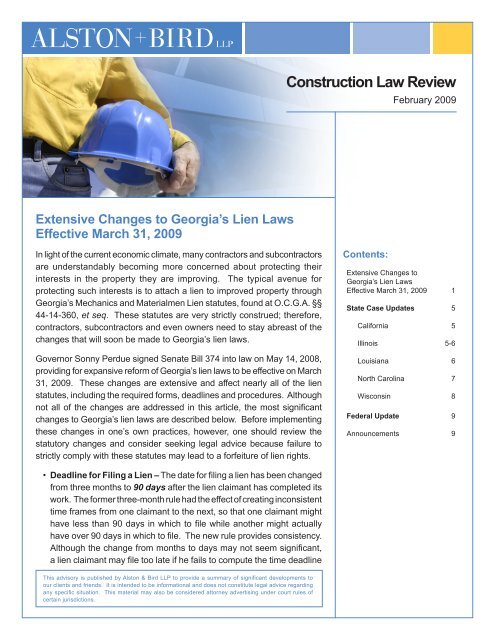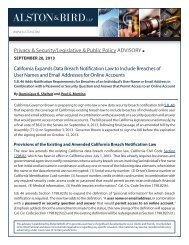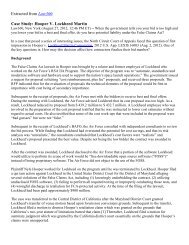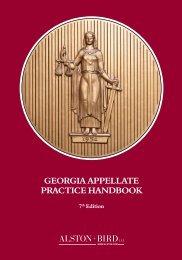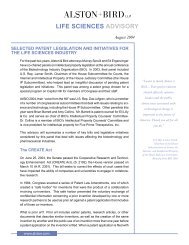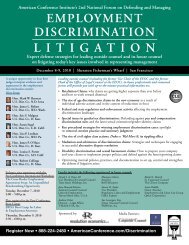Construction Law Review - Alston & Bird LLP
Construction Law Review - Alston & Bird LLP
Construction Law Review - Alston & Bird LLP
You also want an ePaper? Increase the reach of your titles
YUMPU automatically turns print PDFs into web optimized ePapers that Google loves.
Extensive Changes to Georgia’s Lien <strong>Law</strong>s<br />
Effective March 31, 2009<br />
In light of the current economic climate, many contractors and subcontractors<br />
are understandably becoming more concerned about protecting their<br />
interests in the property they are improving. The typical avenue for<br />
protecting such interests is to attach a lien to improved property through<br />
Georgia’s Mechanics and Materialmen Lien statutes, found at O.C.G.A. §§<br />
44-14-360, et seq. These statutes are very strictly construed; therefore,<br />
contractors, subcontractors and even owners need to stay abreast of the<br />
changes that will soon be made to Georgia’s lien laws.<br />
Governor Sonny Perdue signed Senate Bill 374 into law on May 14, 2008,<br />
providing for expansive reform of Georgia’s lien laws to be effective on March<br />
31, 2009. These changes are extensive and affect nearly all of the lien<br />
statutes, including the required forms, deadlines and procedures. Although<br />
not all of the changes are addressed in this article, the most significant<br />
changes to Georgia’s lien laws are described below. Before implementing<br />
these changes in one’s own practices, however, one should review the<br />
statutory changes and consider seeking legal advice because failure to<br />
strictly comply with these statutes may lead to a forfeiture of lien rights.<br />
• Deadline for Filing a Lien – The date for filing a lien has been changed<br />
from three months to 90 days after the lien claimant has completed its<br />
work. The former three-month rule had the effect of creating inconsistent<br />
time frames from one claimant to the next, so that one claimant might<br />
have less than 90 days in which to file while another might actually<br />
have over 90 days in which to file. The new rule provides consistency.<br />
Although the change from months to days may not seem significant,<br />
a lien claimant may file too late if he fails to compute the time deadline<br />
This advisory is published by <strong>Alston</strong> & <strong>Bird</strong> <strong>LLP</strong> to provide a summary of significant developments to<br />
our clients and friends. It is intended to be informational and does not constitute legal advice regarding<br />
any specific situation. This material may also be considered attorney advertising under court rules of<br />
certain jurisdictions.<br />
<strong>Construction</strong> <strong>Law</strong> <strong>Review</strong><br />
Contents:<br />
February 2009<br />
Extensive Changes to<br />
Georgia’s Lien <strong>Law</strong>s<br />
Effective March 31, 2009 1<br />
State Case Updates 5<br />
California 5<br />
Illinois 5-6<br />
Louisiana 6<br />
North Carolina 7<br />
Wisconsin 8<br />
Federal Update 9<br />
Announcements 9
in days. Therefore, a lien claimant should be careful when computing the filing deadline or else risk filing<br />
too late and forfeiting lien rights.<br />
• Deadline for Filing a Legal Action – Similarly, the date for filing a legal action to enforce a lien right has<br />
been changed from 12 months from the date the debt “became due” to 365 days after the date the lien<br />
claimant filed the claim of lien. In the past, Georgia courts have interpreted the date a debt “became due”<br />
to be the date that a lien claimant filed a claim of lien. Thus, the change to running an action from the<br />
date the claim was filed provides clarity. Again, the change from months to days may affect the date a<br />
legal action must be filed to enforce a lien or else the lien claimant will risk filing a legal action to enforce<br />
a lien right too late.<br />
• Deadline for Notice of Filing a Legal Action – Previously, lien claimants had 14 days after commencement<br />
of an action to file notice of the legal action in the superior court in which the lien was filed. Under the<br />
revised lien laws, lien claimants now have 30 days to file notice of legal action in the superior court.<br />
This extended time period will ensure that a valid lien claim is not dismissed as a result of delay by<br />
courthouse employees in sending back a filed copy of the legal action.<br />
• Method of Calculating Deadlines – In the past, Georgia courts enforced a deadline for filing a lien or<br />
filing a legal action even if that deadline fell on a weekend or federal holiday. In practice, this meant that<br />
the lien or legal action had to be filed on the prior business day, in effect shortening the time period for<br />
filing. This method of calculation has been changed under the 2009 lien law revisions. As of March 31,<br />
if a deadline for filing a lien or filing a legal action falls on a weekend or federal holiday, the deadline will<br />
be extended to the next business day. Therefore, lien claimants are less likely to miss filing deadlines<br />
that were erroneously computed under the assumption that federal holidays and weekends extended<br />
such deadlines.<br />
Notice of Claim of Lien –<br />
• Previously, a lien claimant was required to send a copy of the claim of lien<br />
to the owner or contractor, as the agent of the owner, “at the time of filing for record.” This requirement<br />
caused confusion as to when the lien claimant was to send a copy of the claim of lien and to whom this<br />
copy should be sent. The new lien law revisions provide clarity by giving the lien claimant no more than<br />
“two business days after the date the claim of lien is filed of record” in which to send a copy of the lien to<br />
the owner, or, if the owner’s address cannot be found, to the contractor.<br />
2
• Lien Language – In the past, a claim of lien was only required to include the statutory language describing<br />
the contents of such a claim “in substance.” However, the lien law revisions impose a new mandatory<br />
language requirement. Therefore, any lien filed after March 31, 2009, must include on the face of the lien<br />
in at least 12-point bold font: “This claim of lien expires and is void 395 days from the date of filing of the<br />
claim of lien if no notice of commencement of lien action is filed in that time period.” Failure to include<br />
such language will invalidate the lien, and no release or voiding of such liens will be required.<br />
• Discharge of Lien by Bond – Previously, an owner or contractor could discharge a lien by filing a bond<br />
in the superior court where the real estate was located. For commercial property, a bond had to be in an<br />
amount equal to double the amount of the claim of lien; for residential property, a bond had to be in an<br />
amount equal to the claim of lien. Under the revised lien law statutes, the bond discharge requirements<br />
are the same but there is a new notice requirement. Within seven days of filing a bond to discharge a<br />
lien, the party filing the bond must send notice and a copy of the bond by registered or certified mail or<br />
statutory overnight delivery to the lien claimant at the address stated on the lien.<br />
• Notice to Contractor – Under the existing law, a lien claimant not in privity of contract with the general<br />
contractor must preserve his lien rights after properly filing a “Notice of Commencement” by “giving” a<br />
“Notice to Contractor” to both the owner and general contractor. The existing law does not state how<br />
the lien claimant is to “give” this Notice to Contractor to the owner and contractor. The revised lien law<br />
clarifies this process. Under the new lien law, the Notice to Contractor must “be sent by registered or<br />
certified mail or statutory overnight delivery.” Consequently, there should be fewer disputes over whether<br />
an owner or contractor has properly been “given” notice.<br />
Lien Waiver Forms –<br />
• Georgia lien waivers will change in both form and substance under the lien law<br />
revisions. Specifically, all interim and final lien waivers must be in boldface capital letters in at least<br />
12-point font. Further, under current Georgia law, a party is conclusively assumed to have been paid in<br />
full 30 days after execution of a lien waiver and release unless a claim of lien or affidavit of nonpayment<br />
is filed in the interim. However, as of March 31, 2009, the 30-day period will be extended to 60 days.<br />
Interim and final lien waivers must be modified as of March 31, 2009, to provide notice of this new 60-day<br />
period. Currently, interim lien waivers are not required to have any such notice statement, and final lien<br />
waivers are required to have a generic statement regarding unconditional waiver of rights.<br />
3
Under the statutory revisions, both interim and final lien waivers must contain the following statement:<br />
NOTICE: WHEN YOU EXECUTE AND SUBMIT THIS DOCUMENT, YOU SHALL BE CONCLUSIVELY<br />
DEEMED TO HAVE BEEN PAID IN FULL THE AMOUNT STATED ABOVE, EVEN IF YOU HAVE NOT<br />
ACTUALLY RECEIVED SUCH PAYMENT, 60 DAYS AFTER THE DATE STATED ABOVE UNLESS YOU<br />
FILE EITHER AN AFFIDAVIT OF NONPAYMENT OR A CLAIM OF LIEN PRIOR TO THE EXPIRATION OF<br />
SUCH 60 DAY PERIOD. THE FAILURE TO INCLUDE THIS NOTICE LANGUAGE ON THE FACE OF THE<br />
FORM SHALL RENDER THE FORM UNENFORCEABLE AND INVALID AS A WAIVER AND RELEASE<br />
UNDER O.C.G.A. SECTION 44-14-366.<br />
• Notice of Contest of Lien – Currently, the existing lien law does not provide a statutory right for an<br />
owner or contractor to expedite the filing of a legal action on a lien. As of March 31, 2009, however, an<br />
owner or contractor may elect to shorten the time in which a claimant must commence a lien action to<br />
enforce a claim of lien by recording in the superior court clerk’s office a statutory notice of contest of lien<br />
and sending of copy of the same to the claimant within seven days of filing. The lien will be extinguished<br />
90 days after filing of the notice of contest of lien if no notice of commencement is filed in that period, with<br />
no voiding or release of lien required.<br />
• Voiding a Lien – Currently, if no notice is filed by a claimant with the applicable superior court within<br />
14 months from the time the claim became due, an owner may file a request to have the lien marked void<br />
with the superior court and forward such request to the lien claimant. If the lien claimant objects to such a<br />
request within 30 days on the basis that proper notice was timely filed, the lien will not be marked void and<br />
either party may request relief in the superior court. As of March 31, 2009, a claim of lien may be disregarded<br />
if no statutory notice is filed within 13 months from the date the claim of lien was filed. The requirement that<br />
an owner file a request to void the lien has been eliminated from the new version of the statute.<br />
– Kate Miller & Julie Ross<br />
4
STATE CASE NOTES<br />
California<br />
Workers’ Compensation <strong>Law</strong>s Do Not Bar Independent Contractor Hired by Subcontractor<br />
from Suing General Contractor<br />
Fillner <strong>Construction</strong>, Inc. was the general contractor on a gas station project. Fillner contracted with Lane<br />
Supply, which hired Perry <strong>Construction</strong>, Inc. to install a canopy at the project site. Perry hired Jeffrey Tverberg,<br />
an independent contractor, to construct the canopy. During construction, Tverberg fell into an uncovered<br />
hole dug close to the spot where the canopy was to be erected. He alleged personal physical and emotional<br />
injuries. He further alleged that the injuries affected his relationship with his wife. The trial court granted<br />
summary judgment for Fillner. Citing Michael v. Denbeste Transportation, Inc., 137 Cal.App.4th 1082 (2006),<br />
the trial court found that Fillner owed no duty of care to the Tverbergs because it did not affirmatively contribute<br />
to the injuries sustained.<br />
The Court of Appeals reversed. The court recognized that, under Privette v. Superior Court, 5 Cal. 4th 689<br />
(1993), the hirer of a contractor owes no duty of care to the contractor’s injured employee because the<br />
employee has an alternative remedy through the workers’ compensation system. Workers’ compensation,<br />
however, only applies to an employee; it does not extend to an independent contractor such as Tverberg.<br />
Thus, the court found that the Privette doctrine did not apply in the Tverbergs’ case. The court went further<br />
to criticize the Michael decision, stating that it failed to analyze the public policy reasons behind the Privette<br />
decision. After conducting its own public policy analysis, the court found that, as an independent contractor,<br />
Tverberg should not be precluded from seeking recovery from Fillner.<br />
Tverberg v. Fillner Const., Inc., 168 Cal.App.4th 1278, 86 Cal.Rptr.3d 265 (2008)<br />
Illinois<br />
Removal of Hazardous Waste Drums Does Not Constitute an “Improvement” for Purposes<br />
of the Illinois Mechanic’s Lien <strong>Law</strong> Act<br />
In its decision in Inter-Rail Systems, Inc. v. Ravi Corp., the Illinois Appellate Court has announced limitations<br />
to the state’s mechanics lien law. The defendant, an owner of a parking lot and warehouse containing several<br />
drums of hazardous materials, was ordered by the U.S. Environmental Protection Agency to clean up the<br />
site, which included scraping, sweeping and decontaminating the site. In conjunction with its clean-up efforts,<br />
the defendant contracted with the plaintiff for the removal and disposal of the drums from the premises.<br />
Upon the completion of its portion of the clean-up and the defendant’s failure to pay the contract balance,<br />
plaintiff filed a mechanic’s lien against the property and filed suit to enforce the lien. In support of its right to<br />
a mechanic’s lien, the plaintiff successfully argued that its removal of the drums constituted an “improvement”<br />
to the site under the Illinois Mechanics Lien Act.<br />
The Illinois Appellate Court, however, disagreed. The court concluded that “the activity of removing and<br />
disposing of drums containing hazardous waste, in and of itself, does not constitute an improvement to real<br />
property so as to be alienable activity under the Act.” In rendering its decision, the court noted that the “plaintiff<br />
did not perform the work that resulted in the filling of the drums with the hazardous waste.<br />
5
It made no changes to the structure of the buildings or its land either by repair or demolition other than to facilitate<br />
waste removal. It merely removed and disposed of the drums, already filled with the waste, and performed<br />
incidental cleaning activities. None of these activities were shown to be part of an overall plan to improve<br />
rather than simply maintain the property.” Where the plaintiff’s scope of work does not bestow an improvement<br />
on the property, the court declined to extend the state’s mechanic lien statute to ensure payment.<br />
Inter-Rail Systems, Inc. v. Ravi Corp., No. 1-07-2369, 2008 WL 5382045 (Ill. App. 1 Dis. Dec. 22, 2008)<br />
Louisiana<br />
Materialman Loses Its Right to Lien a Public Works Project by Failing to Give Notice<br />
of Nonpayment Prior to Filing the Lien<br />
In Teche Electric Supply, LLC v. M.D. Descant, Inc., et al., the State of Louisiana contracted with a general<br />
contractor for the construction of the Southwest Louisiana War Veterans Home. A subcontractor on the<br />
project filed for bankruptcy before paying its materialman in full. The materialman filed a statement of lien<br />
and privilege against the subcontractor for the full amount owed and thereafter mailed a notice of nonpayment<br />
to the state and the general contractor. The state accepted the project, and the materialman filed suit for the<br />
full amount of its lien. The defendants moved for summary judgment on the ground that the materialman<br />
failed to preserve its right to lien by not providing proper notice of nonpayment under La.R.S 38:2442(F) in<br />
the Louisiana Public Works Act. The trial court denied the motion.<br />
La.R.S 38:2442 provides that a claimant must, within 45 days after the recordation of acceptance of the work<br />
or a notice of default, file a sworn statement of the amount due with the governing authority and record it in<br />
the parish where the work is done. La.R.S. 38:2442 was amended in 1999 to add subsection (F). Subsection<br />
(F) states that, if a materialman has not been paid by a subcontractor and has not sent notice of nonpayment<br />
to the general contractor and the owner on or before 75 days from the last day of the month in which the<br />
material was delivered, the materialman loses the right to lien.<br />
On appeal, Louisiana’s Third Circuit Court of Appeal reversed the trial court, holding that, while the previous law<br />
did not include a notice requirement, La.R.S. 38:2442(F) clearly changed the law. Because the materialman<br />
had failed to furnish notice of nonpayment prior to filing its lien, it lost its right to file a lien or privilege.<br />
As a result, the materialman had no viable claim against the defendants.<br />
Teche Electric Supply, LLC v. M.D. Descant, Inc., No. 08-171, 2008 WL 5177841 (L.A. Ct. App. Dec. 11, 2008)<br />
6
North Carolina<br />
Suits Filed on Behalf of Unlicensed Contractors Not Per Se Ground for Rule 11 Sanctions<br />
in North Carolina<br />
In Persis Nova Const., Inc., the contractor brought suit against the defendants for allegedly failing to pay the<br />
full amount due under their contract for the construction of a home in Catawba County, North Carolina. While<br />
the defendants admitted in their initial response that the contractor was a North Carolina corporation with its<br />
principal place of business in Mecklenburg County, nearly 19 months later the defendants moved for summary<br />
judgment after discovering that the contractor was not a licensed corporation in North Carolina, nor did it hold<br />
a general contractor’s license. Finding that the contractor was unlicensed within the meaning of Chapter<br />
87 of the North Carolina General Statutes, the trial court granted the defendants’ motion and dismissed the<br />
contractor’s claim. Only weeks after the ruling, the defendants filed a motion for Rule 11 sanctions against<br />
the contractor’s attorneys, which was denied following a hearing. The defendants then appealed.<br />
In its opinion, the North Carolina Court of Appeals began by noting the three elements to a Rule 11 analysis:<br />
“(1) factual sufficiency, (2) legal sufficiency, and (3) improper purpose.” A violation of any one of the requirements<br />
is sufficient to support Rule 11 sanctions, and the defendants focused on the first and third elements only.<br />
The elements of factual sufficiency in North Carolina are: “(1) whether the plaintiff undertook a reasonable<br />
inquiry into the facts and (2) whether the plaintiff, after reviewing the results of his inquiry, reasonably believed<br />
that his position was well grounded in fact.” Considering the efforts made by the contractor’s counsel to<br />
investigate the contractor’s corporate and licensing status, the court found that a reasonable inquiry had been<br />
undertaken and disagreed with the defendants that a complaint filed by an unlicensed contractor in North<br />
Carolina is per se factually insufficient.<br />
The court then turned to the improper purpose element. Citing Mack v. Moore, 418 S.E.2d 685 (N.C. App.<br />
1992), the court noted that, in North Carolina, an improper purpose is “any purpose other than one to vindicate<br />
rights ... or to put claims of right to a proper test.” Examples of improper purposes would include filing excessive<br />
papers, failing to serve an adversary with contested motions or filing suit with no factual basis for the purpose<br />
of “fishing” for some evidence of liability. Under this standard, the court again refused to hold that a complaint<br />
filed by an unlicensed contractor is a per se violation of the improper purpose requirement. Noting the trial<br />
court’s ruling that the complaint was filed reasonably and the failure of the defendants to assign error to that<br />
finding, the court rejected the defendants’ appeal.<br />
Persis Nova Const., Inc. v. Edwards, No. COA07-1501, 2009 WL 129723 (N.C. Ct. App. Jan. 20, 2009)<br />
7
Wisconsin<br />
Developers Deemed Third-Party Beneficiary to Public Works Contract Where Obligated to<br />
Use Town’s Engineering Firm in <strong>Construction</strong> of Subdivision<br />
In Becker v. Crispell-Snyder, Inc., the Court of Appeals of Wisconsin held that developers of a residential<br />
subdivision could maintain a breach of contract claim against a town’s engineering firm based upon a public<br />
works contract between the engineering firm and the town in which the project was located. After purchasing<br />
property and substantially investing in a subdivision, the developers were informed by the town of Somers,<br />
Wisconsin, that they had to use the town’s engineering firm or the project would be shut down. Accordingly,<br />
the developers entered into a development agreement with the town, making the town’s engineering firm the<br />
engineer for the project. As construction continued, the engineering firm billed the town for time spent on the<br />
subdivision pursuant to a public works contract with the town. The town approved every invoice, disregarding<br />
objections by the developers, and withdrew money from the developers’ line of credit to pay the engineering<br />
firm. When the engineering bills became sufficiently high that the town withdrew the developers’ line of credit,<br />
the developers sued the engineering firm, claiming that they were third-party beneficiaries to the engineering<br />
firm’s public works contract with the town.<br />
Although “[t]he scope of potential third-party beneficiaries to public works contracts is more restrictive than<br />
other contracts because the primary purpose of a public works contract is to benefit the public,” the court<br />
held the developers were third-party beneficiaries to the public works contract based upon a three-part test.<br />
First, the public works contract specifically conferred a direct benefit, engineering services, to the developers.<br />
Second, this benefit was limited to a well-defined group of third parties because the plaintiffs and a neighboring<br />
developer were the only third parties receiving engineering services under the public works contract. Third,<br />
the public works contract created a creditor-debtor relationship between the engineering firm and the thirdparty<br />
developers because the public works contract, in concert with the developer’s agreement, implicated the<br />
developers as a debtor to the engineering firm. Based on these factors, the developers had standing to sue<br />
the engineering firm for breach of the public works contract between the engineering firm and the town.<br />
Becker v. Crispell-Snyder, Inc., No. 2008AP53, 2009 WL 80243 (Wis. Ct. App. Jan. 14, 2009)<br />
8
FEDERAL UPDATE<br />
For a Party to Be Indemnified Against Its Own Negligence, the Language of the Contract<br />
Must Be Clear and Unequivocal<br />
In Dowling v. Georgia-Pacific Corporation, an employee of Kellogg Brown & Root, Inc. (KBR) was injured at<br />
a Georgia-Pacific Corp. (GP) facility at which GP had contracted with KBR to perform construction work. GP<br />
settled the claim filed by the injured employee. The settlement did not allocate fault between GP and KBR,<br />
but GP sought full indemnification from KBR pursuant to the contract’s indemnification provisions. The district<br />
court granted GP’s request for indemnification.<br />
The United States Court of Appeals for the Fifth Circuit reversed the district court’s ruling. Interpreting Louisiana<br />
law, the court noted that, for a party to be indemnified against its own negligence, the language of the contract<br />
must be clear and unequivocal. Because the contract only required KBR to indemnify GP to the extent of<br />
losses arising out of KBR’s conduct and the settlement agreement had failed to assign any fault to KBR,<br />
GP’s request for indemnification potentially covered GP’s own negligence. The court, therefore, held that the<br />
language of the contract was not clear enough to require KBR to indemnify GP under such circumstances.<br />
Dowling v. Georgia-Pacific Corp., 2008 U.S. App. LEXIS 24911 (5th Cir. Dec. 10, 2008)<br />
ANNOUNCEMENTS<br />
•<br />
Associate Andy Howard Has Relocated to <strong>Alston</strong> & <strong>Bird</strong>’s Office in Los Angeles, California<br />
• Partner Bill Hughes has made presentations relevant to the energy construction industry at the country’s<br />
leading energy conferences. He made a presentation at the Coal-Gen Conference in Louisville,<br />
Kentucky, on August 13, 2008, entitled “Geologic Carbon Sequestration: Strategy & Key Challenges<br />
– Rapid Changes in the Legal Landscape.” This was followed by a presentation in Orlando, Florida,<br />
at the Power-Gen Conference on December 4, 2008, where he presented a discussion entitled<br />
“The Effects of Gasification and Synfuels on the Power Industry ‘<strong>Law</strong>, Politics, Technology and Money.’”<br />
He also appeared at the <strong>Construction</strong> SuperConference in San Francisco, California, on December<br />
11, 2008, where he presented “Keys to Success in the Global Power Market.” Bill will be presenting<br />
a more general construction law seminar, entitled “<strong>Construction</strong> <strong>Law</strong> for the General Practitioner,”<br />
at the Georgia Bar Headquarters in Atlanta, Georgia, on April 17, 2009.<br />
• The <strong>Alston</strong> & <strong>Bird</strong> <strong>Construction</strong> and Government Contracts Group will host a day-long workshop to<br />
discuss aspects of the stimulus package and related government contracting issues this spring at the<br />
<strong>Alston</strong> & <strong>Bird</strong> Los Angeles office. More information to follow.<br />
• John Spangler, Andy Howard and Donald Brown are co-authors of the chapter “Differing Site Conditions,”<br />
which appears in the Second Edition of the <strong>Construction</strong> <strong>Law</strong> Handbook, published by Aspen this month.<br />
9
If you would like to receive future <strong>Construction</strong> <strong>Law</strong> <strong>Review</strong>s electronically, please forward your<br />
contact information including e-mail address to construction.advisory@alston.com. Be sure<br />
to put “subscribe” in the subject line.<br />
If you have any questions, please contact your <strong>Alston</strong> & <strong>Bird</strong> attorney or any member of the<br />
<strong>Construction</strong> and Government Contracts Group.<br />
Members of <strong>Alston</strong> & <strong>Bird</strong>’s <strong>Construction</strong><br />
and Government Contracts Group<br />
Atlanta<br />
John I. Spangler, III<br />
Practice Group Leader<br />
404.881.7146<br />
john.spangler@alston.com<br />
Jeffrey A. Belkin<br />
404.881.7388<br />
202.756.3065<br />
jeff.belkin@alston.com<br />
Donald G. Brown<br />
404.881.7865<br />
donald.brown@alston.com<br />
Steven Campbell<br />
404.881.7869<br />
steven.campbell@alston.com<br />
Deborah Cazan<br />
404.881.7667<br />
debbie.cazan@alston.com<br />
Los Angeles<br />
Kevin S. Collins<br />
213.576.1184<br />
kevin.collins@alston.com<br />
J. Andrew Howard<br />
404.881.4980<br />
andy.howard@alston.com<br />
Stephanie A. Jones<br />
213.576.1136<br />
stephanie.jones@alston.com<br />
Washington, D.C.<br />
Jamil E. Nasir<br />
202.756.3192<br />
jamil.nasir@alston.com<br />
Daniel F. Diffley<br />
404.881.4703<br />
dan.diffley@alston.com<br />
A. McCampbell Gibson<br />
404.881.7769<br />
mac.gibson@alston.com<br />
William H. Hughes, Jr.<br />
404.881.7273<br />
bill.hughes@alston.com<br />
Thu Trinh H. Huynh<br />
404.881.4397<br />
trinh.huynh@alston.com<br />
Kyle A. Ostergard<br />
213.576.1036<br />
kyle.ostergard@alston.com<br />
G. Christian Roux<br />
Practice Group Leader<br />
213.576.1103<br />
chris.roux@alston.com<br />
Katherine L. Miller<br />
404.881.7947<br />
kate.miller@alston.com<br />
Julie R. Ross<br />
404.881.7648<br />
julie.ross@alston.com<br />
Mike H. Shanlever<br />
404.881.7619<br />
mike.shanlever@alston.com<br />
Aaron Vandiver<br />
404.881.4949<br />
aaron.vandiver@alston.com<br />
Jessica L. Sharron<br />
213.576.1164<br />
jessica.sharron@alston.com<br />
Nathan D. Sinning<br />
213.576.1134<br />
nathan.sinning@alston.com<br />
ATLANTA<br />
One Atlantic Center<br />
1201 West Peachtree Street<br />
Atlanta, GA 30309-3424<br />
404.881.7000<br />
CHARLOTTE<br />
Bank of America Plaza<br />
Suite 4000<br />
101 South Tryon Street<br />
Charlotte, NC 28280-4000<br />
704.444.1000<br />
DALLAS<br />
Chase Tower<br />
Suite 3601<br />
2200 Ross Avenue<br />
Dallas TX 75201<br />
214.922.3400<br />
LOS ANGELES<br />
333 South Hope Street<br />
16th Floor<br />
Los Angeles, CA 90071-3004<br />
213.576.1000<br />
NEW YORK<br />
90 Park Avenue<br />
New York, NY 10016-1387<br />
212.210.9400<br />
RESEARCH TRIANGLE<br />
Suite 600<br />
3201 Beechleaf Court<br />
Raleigh, NC 27604-1062<br />
919.862.2200<br />
SILICON VALLEY<br />
Two Palo Alto Square<br />
Suite 400<br />
3000 El Camino Real<br />
Palo Alto, CA 94306-2112<br />
650.838.2000<br />
VENTURA COUNTY<br />
Suite 215<br />
2801 Townsgate Road<br />
Westlake Village, CA 91361<br />
805.497.9474<br />
WASHINGTON, D.C.<br />
The Atlantic Building<br />
950 F Street, NW<br />
Washington, DC 20004-1404<br />
202.756.3300<br />
www.alston.com<br />
© <strong>Alston</strong> & <strong>Bird</strong> llp 2009


